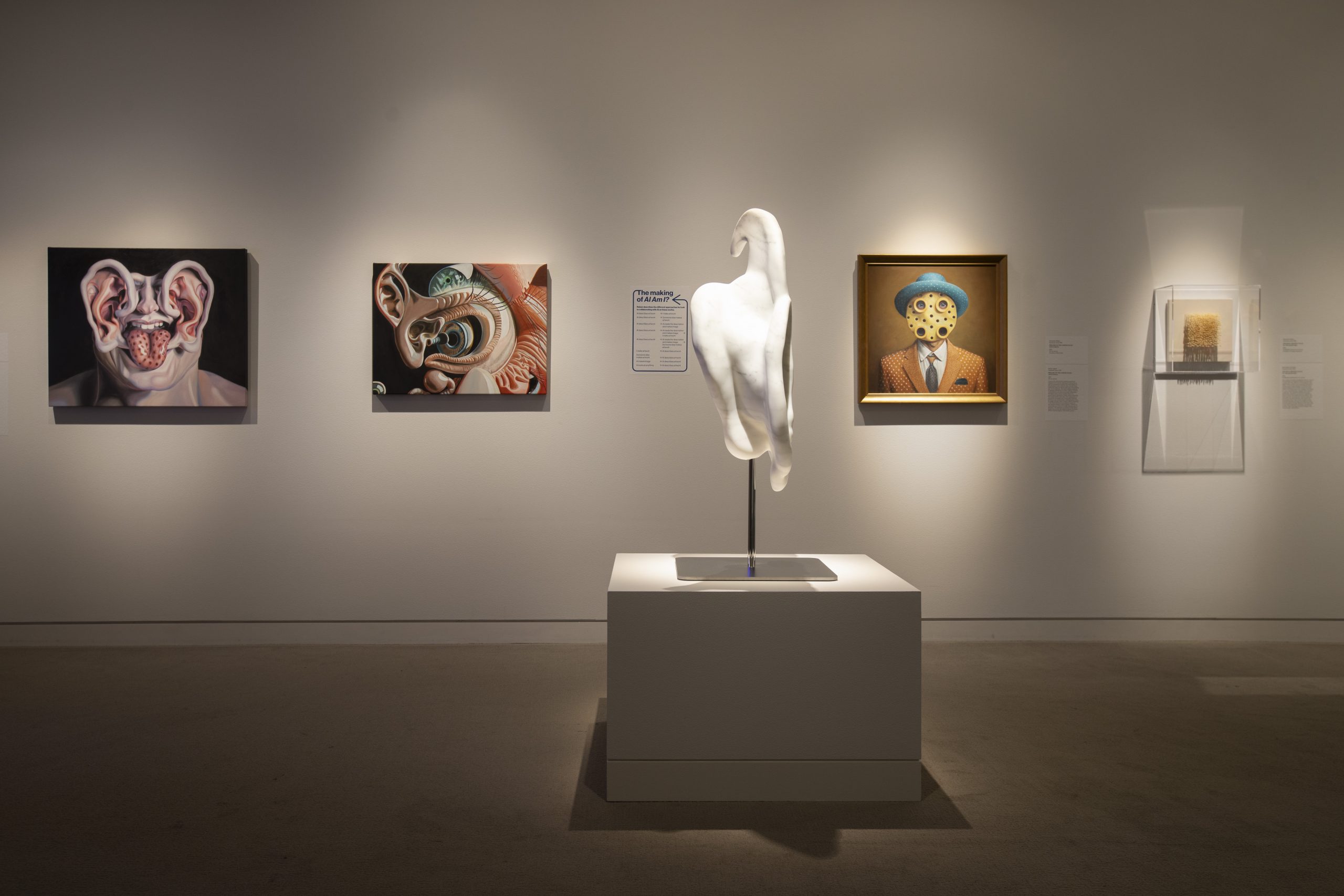On View
Reben has also become the first resident artist at OpenAI.

Artist Alexander Reben is getting his first major retrospective at the Crocker Art Museum, on the heels of becoming the first resident artist at OpenAI, the company behind image generator DALL-E and chatbot ChatGPT.
“AI Am I? Artificial Intelligence as Generated by Alexander Reben” at the California museum brings together deeply conceptual works from across Reben’s practice, which, since about 2012, has seen him co-create alongside A.I. More so, the show aims to unpack what it means to collaborate with algorithms, following the artist’s lead in exploring how human-machine symbioses might lead to creative breakthroughs.
“I let the conceptual idea drive the direction of [the work],” Reben said. “Even if new technology comes out, it might not be the best tool for a particular idea. But when I see new things come out, I tend to come up with new ideas as well, so they tend to come in parallel.”
Reben, who has a background in robotics and math, added he can “digest and interface” with the newest technologies at a programming level, something that gives him control over the outcome that other artists without that background might not achieve.
Take for instance, The Sentinel of Memory in the Valley of Vulnerability (2023), a bronze sculpture that’s a centerpiece of the show. Reben created the work by prompting an A.I. model to describe “a sculpture” before feeding the visual description into DALL-E, allowing the image generator to conjure up the work. He then commissioned an anatomy professor to translate that image into a 3D file which he took to a foundry to 3D print. That form was then cast in bronze.
“It looks like a classic male bust but as you circle around the sculpture, you can see the different elements come to life from the A.I. generated image,” said Francesca Wilmott, the museum’s associate curator. “That work encapsulated so many of the ideas in the show, the back and forth with A.I. as well as his interest in the history of technology.”
The museum has acquired the piece, making it the first A.I.-generated work in its collection.
Alexander Reben, The Sentinel of Memory in the Valley of Vulnerability (2023) Crocker Art Museum, Gift of the Artist and OpenAI
For Reben, another highlight of the show is an interactive piece that invites the public to co-create with him and the A.I. The piece, titled Speak Art Into Life, invites visitors to talk into a microphone, which causes an image to be generated from whatever was spoken. The image compounds with what others have generated into what Reben likened to “an A.I. exquisite corpse.” Visitors will further receive a paper receipt with a QR code that allows them to view the generated image from home later.
Speak Art Into Life also happens to utilize every type of A.I. technology offered by OpenAI, where Reben’s residency is likely to last three months. The artist had been using these OpenAI products since they entered beta testing in 2020, according to the company’s Natalie Summers, and has had significant input into the company’s offerings.
Reben hopes he can help steer the residency program in a way he finds “interesting” and beneficial for future artists. Summer, in turn, praised Reben for being able to address concerns surrounding A.I. in an educational way.
“Artists do much more than advocate on behalf of other artists. They really do make sense of the world around you. Artists help stand in for humanity as a whole I think no other real field does,” Summers said.
“With ultra-contemporary art like A.I. and generative art, it changes continuously,” Reben added. “From a cultural standpoint, this art form is starting to become more mature and accepted. In a meta way, that’s what this show is doing.”
And how should visitors approach his works on view?
“The most important thing: come with an open mind,” he said. “The show has more questions than answers, which is good. I think there’s a lot of assumptions made by A.I. and creativity. I think this subverts some of that.”
See more images from the show below.
Alexander Reben, The Mechanical Swarm (2022). Courtesy of the artist.
Alexander Reben, A Short History of Plungers and Other Things That Go Plunge in the Night (2020). Courtesy of the artist
Installation view of “AI Am I? Artificial Intelligence as Generated by Alexander Reben” at the Crocker Art Museum. Photo courtesy of Crocker Art Museum.
“AI Am I? Artificial Intelligence as Generated by Alexander Reben” is on view at the Crocker Art Museum, 216 O Street, Sacramento, California, through April 28, 2024.
More Trending Stories:
Revealed: The Major Mystery Consignors of New York’s Multi-Billion-Dollar Fall Auction Season
Christie’s Pulled Two Works by a Prominent Middle Eastern Artist From Sale After a Complaint
Follow Artnet News on Facebook:
Want to stay ahead of the art world? Subscribe to our newsletter to get the breaking news, eye-opening interviews, and incisive critical takes that drive the conversation forward.

